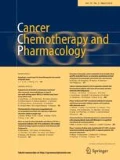Abstract
Purpose
The purpose of the current study is to analyze a series of phase I cancer clinical trials, examine and compare trial protocols based on patients’ eligibility criteria.
Methods
We evaluated all dose escalation phase I trial protocols with accessible or published results performed at Institute for Drug Development, Cancer Therapy and Research Center (San Antonio) between 1991 and 2016. Study protocols were categorized as non-restrictive (NRP) or restrictive (RP) based on several eligibility parameters. Fisher’s Exact and Chi-square tests were used to compare characteristics of NRP and RP.
Results
Of 284 protocols screened, 231 dose escalation phase I trial protocols (with accessible results) of solid tumors were included in this review. There were 145 NRP (involving 3190 patients) and 86 RP (involving 1892 patients). The median number of exclusion criteria for NRP and RP were 14 and 23, respectively. The most common reasons that made trial protocol to be restrictive were ECOG ≤ 1, strict requirements for renal or hepatic function (≤ 2.5 times upper limit of normal) and exclusion of subjects with brain metastases. The median accrual time for NRP was significantly shorter as compared to RP (17 vs 26 months). The median number of dose levels explored in NRP and RP were 9 and 6, respectively. RP had a higher screen failure as well as premature closure rate. The rates of DLTs, SAEs, toxicity-related death and response were not different between the two groups.
Conclusions
Our study findings are in support of devising well thought and justified phase I study eligibility criteria.
References
Bennette CS, Ramsey SD, McDermott CL, Carlson JJ, Basu A, Veenstra DL (2016) Predicting LOW ACCRUAL in the National Cancer Institute’s Cooperative Group Clinical Trials. J Natl Cancer Inst. https://doi.org/10.1093/jnci/djv324
Kim ES, Bruinooge SS, Roberts S, Ison G, Lin NU, Gore L, Uldrick TS, Lichtman SM, Roach N, Beaver JA, Sridhara R, Hesketh PJ, Denicoff AM, Garrett-Mayer E, Rubin E, Multani P, Prowell TM, Schenkel C, Kozak M, Allen J, Sigal E, Schilsky RL (2017) Broadening eligibility criteria to make clinical trials more representative: American Society of Clinical Oncology and Friends of Cancer Research Joint Research Statement. J Clin Oncol 35(33):3737–3744. https://doi.org/10.1200/jco.2017.73.7916
Miller AB, Hoogstraten B, Staquet M, Winkler A (1981) Reporting results of cancer treatment. Cancer 47(1):207–214
Therasse P, Arbuck SG, Eisenhauer EA, Wanders J, Kaplan RS, Rubinstein L, Verweij J, Van Glabbeke M, van Oosterom AT, Christian MC, Gwyther SG (2000) New guidelines to evaluate the response to treatment in solid tumors. European Organization for Research and Treatment of Cancer, National Cancer Institute of the United States, National Cancer Institute of Canada. J Natl Cancer Inst 92(3):205–216
Eisenhauer EA, Therasse P, Bogaerts J, Schwartz LH, Sargent D, Ford R, Dancey J, Arbuck S, Gwyther S, Mooney M, Rubinstein L, Shankar L, Dodd L, Kaplan R, Lacombe D, Verweij J (2009) New response evaluation criteria in solid tumours: revised RECIST guideline (version 1.1). Eur J Cancer 45(2):228–247. https://doi.org/10.1016/j.ejca.2008.10.026
Malik L, Lu D (2018) Increasing complexity in oncology phase I clinical trials. Investigational New Drugs. https://doi.org/10.1007/s10637-018-0699-1
Fu S, McQuinn L, Naing A, Wheler JJ, Janku F, Falchook GS, Piha-Paul SA, Tu D, Howard A, Tsimberidou A, Zinner R, Hong DS, Kurzrock R (2013) Barriers to study enrollment in patients with advanced cancer referred to a phase I clinical trials unit. Oncologist 18(12):1315–1320. https://doi.org/10.1634/theoncologist.2013-0202
Lara PN Jr, Higdon R, Lim N, Kwan K, Tanaka M, Lau DH, Wun T, Welborn J, Meyers FJ, Christensen S, O’Donnell R, Richman C, Scudder SA, Tuscano J, Gandara DR, Lam KS (2001) Prospective evaluation of cancer clinical trial accrual patterns: identifying potential barriers to enrollment. J Clin Oncol 19(6):1728–1733. https://doi.org/10.1200/jco.2001.19.6.1728
Gerber DE, Laccetti AL, Xuan L, Halm EA, Pruitt SL (2014) Impact of prior cancer on eligibility for lung cancer clinical trials. J Natl Cancer Inst. https://doi.org/10.1093/jnci/dju302
Fountzilas C, Stuart S, Hernandez B, Bowhay-Carnes E, Michalek J, Sarantopoulos J, Karnad A, Patel S, Weitman S, Mahalingam D (2017) Risks and benefits of phase I liver dysfunction studies: should patients with severe liver dysfunction be included in these trials? Investigational New Drugs 35(3):386–391. https://doi.org/10.1007/s10637-017-0425-4
Funding
None.
Author information
Authors and Affiliations
Corresponding author
Ethics declarations
Conflict of interest
The author(s) declare that they have no competing interests. All authors had full control of all primary data, which are available for review upon request.
Ethical approval
All procedures performed in studies involving human participants were in accordance with the ethical standards of the institutional and with the 1964 Helsinki declaration and its later amendments or comparable ethical standards.
Additional information
Publisher’s Note
Springer Nature remains neutral with regard to jurisdictional claims in published maps and institutional affiliations.
Rights and permissions
About this article
Cite this article
Malik, L., Lu, D. Eligibility criteria for phase I clinical trials: tight vs loose?. Cancer Chemother Pharmacol 83, 999–1002 (2019). https://doi.org/10.1007/s00280-019-03801-w
Received:
Accepted:
Published:
Issue Date:
DOI: https://doi.org/10.1007/s00280-019-03801-w

